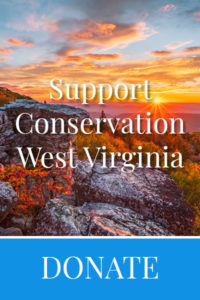West Virginia needs to develop new housing and infrastructure, and industrial sites that can employ us into the future.
As we have seen in Jefferson County recently, government decisions about industrial development have tended to overvalue speculative promises about jobs and undervalue public concerns about air and water pollution and long-term community well-being.
West Virginia needs to develop new housing and infrastructure, and industrial sites that can employ us into the future. But these development decisions must be balanced and sensitive to their environmental consequences and to public health issues. Our government should not be permitted automatically to put public concerns about conservation in second place behind the quest for more jobs.
Our Development Platform
We support legislation that will require the DEP to hold an air quality permit public hearing for any large new industrial facility in the county where the facility is to be located.
We support requiring new heavy industrial facilities to be strictly located in special zones set aside by counties for such industry after public input, taking account of pre-existing land use, the location of other industry and infrastructure, environmental conditions, and the location of schools and cultural sites.
2024 Development Bills
HB 4652
Natural Gas Fired Electric Generation Act of 2024
The purpose of this bill is to encourage development, transportation and use of electricity generated using West Virginia natural gas by directing the West Virginia Economic Development Authority to identify and designate sites suitable for natural gas electric generation facilities and by providing for expedited consideration and decision concerning applications for permits to construct and operate natural gas electric generation facilities.
CWV Position: Opposes
Status: Introduced 1/12/2024; referred to; referred to Energy and Manufacturing, then Government Organization
HB 4656
PSC Jurisdiction Over Advanced Nuclear Microreactors
The purpose of this bill is to expand the jurisdiction of the Public Service Commission to include advanced nuclear reactors, and to direct that agency to adopt regulations for the construction, operation and retirement of such reactors.
CWV Position: Supports
Status: Introduced 1/12/2024; referred to; referred to Energy and Manufacturing
HB 4712
Limiting Wind Power Projects
This bill would limit the number of wind power projects approved in the state each year to two and allow a 5% reduction in coal severance tax for each such project approved.
Sponsors: Phil Mallow
CWV Position: Opposes
Status: Introduced 1/15/2024; referred to Energy and Manufacturing, then Finance
HB 4784
Residential Set Backs for New Wind Turbines
The bill prohibits new wind turbines within two miles of any residence.
Sponsors: Phil Mallow, Larry Kump
CWV Position:
Status: Introduced 1/16/2024; referred to Energy and Manufacturing, then Judiciary
HB 4968
Regulating Radioactive Material
Among other things, this bill would make WV an "agreement state" for uniformity of rules relating to radioactive material with the federal NRC and other states; it would make the DEP the designated state radiation control agency; it would require a license for any handling or manufacture of radioactive material and would forbid the disposal of such material into landfills.
Sponsors: Clay Riley, Bob Fehrenbacher, Bill Anderson, Chuck Horst
CWV Position: Supports
Status: Introduced 1/122/2024; referred to Energy and Manufacturing
HB 5047
Amending Surface Mining Reclamation Requirements
This bill would assure that bonding and reclamation requirements are adequate to assure that post mining reclamation is completed and paid for by coal mining operators and does not become a financial liability to state taxpayers; revising bonding requirements to require the bond be set for actual reclamation costs; forbidding the issuance of new permits to operators who have not fulfilled prior reclamation obligations.
Sponsors: Evan Hansen
CWV Position: Supports
Status: Introduced 1/23/2024; referred to Energy and Manufacturing, then Finance
HB 5416
Use of Degraded Land for Solar Panel Location
This bill seeks creates a tax incentive for power generation companies to locate solar power facilities on degraded mine and industrial land instead of farm land.
Sponsors: Evan Hansen
CWV Position: Supports
Status: Introduced 2/1/2024; referred to Energy and Manufacturing, then Finance
HB 5528
Renewable Energy Facilities Program
Raising the incremental increases in size of renewable energy facilities from 50 to 100 megawatts, and eliminating the 2025 sunset provision.
Sponsors: Bill Anderson, Bob Fehrenbacher, Scot Heckert, Wayne Clark, Evan Hansen
CWV Position: Supports
Status: Introduced 2/8/2024; referred to Energy and Manufacturing; passed House 2/19/24; passed Senate 3/7/24; vetoed by Governor
HB 5626
Community Solar Pilot Program
Creates a community solar pilot program allowing participation by low-income and other consumers in the benefits of solar power although individually unable to mount solar panels at their home or business. Requires bill credit to be given to subscribing consumers for their share of solar power generated. Encourages location of community solar facilities on otherwise unfavorable land or in areas where it can be co-located with agriculture.
CWV Position: Supports
Status: Introduced 2/12/2024, referred to Energy & Manufacturing, then Judiciary
SB 171
Restricting County Commissions Regulating Certain Agricultural Practices
This bill would prohibit county commissions from passing ordinances regulating agriculture that are broader or more strict than state standard, and would forbid county commissions from regulating the location and use of pesticides licensed under state or federal law.
CWV Position: Opposes
Status: Introduced 1/10/2024, passed Senate same day and referred to House; passed House 2/13/24; signed by Governor 2/26/24
SB 196
West Virginia Rail Trails Program
This bill would direct a division of the Department of Transportation to acquire active or inactive rail corridors for the use of non-motorized trails for hiking, biking and equestrian use. Electric bicycles would be permitted.
Sponsors: Charles Trump
CWV Position: Supports
Status: Introduced 1/10/2024, referred to Outdoor Recreation, then Judiciary
SB 478
Energy Intensive Industry Tax Credit
The bill seeks to induce businesses that consume large amount of energy to locate in West Virginia by offering a tax credit in exchange for the promise of creating 25 jobs.
CWV Position: Opposes
Status: Introduced 1/17/2024; referred to Finance
SB 512
Taxation of Solar Farms
Establishing for tax purposes that the business of farming does not include the development, operation or ownership of a solar farm unless the solar arrays are elevated such that pasture animals may graze underneath.
Sponsors: Patricia Rucker
CWV Position:
Status: Introduced 1/10/2024, referred to Agriculture and Natural Resources, then Finance
SB 638
Community Solar Pilot Program
Creates a community solar pilot program allowing participation by low-income and other consumers in the benefits of solar power although individually unable to mount solar panels at their home or business. Requires bill credit to be given to subscribing consumers for their share of solar power generated. Encourages location of community solar facilities on otherwise unfavorable land or in areas where it can be co-located with agriculture.
Sponsors: Mike Oliverio
CWV Position: Supports
Status: Introduced 2/5/2024, referred to Economic Development, then Finance
SB 822
Carbon Offset Agreement
Strongly disfavors carbon offset agreements by removing them from favorable tax treatment as managed timberlands, requiring the purchaser to register and pay an excise tax of as much as 50% of the value of the agreement to the landowner, and declaring it West Virginia public policy to void the restrictions on future timbering in private covenants, thereby jeopardizing conservation easements.
CWV Position: Opposes
Status: Introduced 2/16/24, referred to Finance; committee substitute 2/26/24; read third time 2/28/24; removed from calendar by Rules Committee 2/28/24
Click here to add your own text

